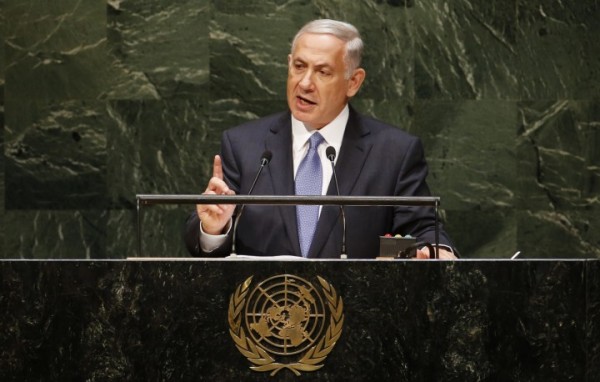by Peter Jenkins
The Prime Minister of Israel addressed the UN General Assembly on Sept. 29, once more filling the chamber with fire and brimstone.
Like many a leader before him, he built his speech on the well-tried formula that attack is the best form of defense.
Not for him to make any attempt to justify Israel’s settlement of 500,000 Israelis in occupied territory on the West Bank. Not for him to accept any share of responsibility for the collapse of the peace talks into which Secretary of State John Kerry invested so much energy and good intention. Not for him to explain why Israel has failed to follow Syria’s example in adhering to the Chemical Weapons Convention and continues to resist pressure to move towards a Middle East free of nuclear weapons.
Instead, Mr. Netanyahu set out to distract attention from Israeli shortcomings, and to win sympathy, by persuading his listeners that the greatest embodiments of evil in the Middle East are Hamas and the Islamic government in Iran.
Hamas and Iran, he asks listeners to believe, are no different from the group that calls itself the Islamic State (IS). All three are vessels of militant Islam. All three crave global domination. All three have embraced a fanatic ideology; their mad belief in a master faith invites comparison with the Nazi belief in a master race.
The comparison with Nazi Germany begs a question: will militant Islam ever have the power to realize its unbridled ambitions? Mr. Netanyahu believes that it will, unless stopped short, because he continues to believe that Iran is determined to acquire nuclear weapons. For him, the current Iranian show of moderation and commitment to the Nuclear Non-Proliferation Treaty (NPT) is merely a manipulative charm offensive, designed to persuade the US and its allies to lift sanctions and remove obstacles on Iran’s path to acquiring nuclear weapons.
There is a steadfast quality to Mr. Netanyahu that compels admiration. The US intelligence community has estimated since 2007 that Iran no longer has a nuclear weapon program. Several senior Israeli intelligence and military officials have allowed the public to learn that they share the US assessment. Western leaders have decided that they can afford to risk domestic criticism by negotiating an agreement that will leave Iran in possession of uranium enrichment technology, since that is not outlawed by the NPT. Yet, still, Mr. Netanyahu clings to the view he first voiced 22 years ago: Iran wants enrichment facilities because it wants nuclear weapons.
That said, some evolution in his thinking is discernible. He is no longer prophesying that Iran is on the brink of achieving its nuclear weapon ambition; instead, it is at “a time of its choosing” that Iran “the world’s most dangerous regime, in the world’s most dangerous region”, will obtain “the world’s most dangerous weapon” unless its “military nuclear capabilities” are fully dismantled. He is no longer calling on his US allies to put themselves on the wrong side of international law by conducting a pre-emptive attack on Iran’s nuclear facilities. And he is no longer suggesting that a nuclear-armed Iran would transfer nuclear weapons or material to non-state actors such as IS and Hamas.
It is only in the second part of his speech that Mr. Netanyahu starts to play defense—but, still, he misses no opportunity to go onto the counter-attack.
His initial purpose is to justify the latest Israeli attack on Gaza. His method is simple: heap all the responsibility for the terrible loss of Palestinian non-combatant life on to Hamas; cast a veil over the causes of this outbreak of violence; imply that ordinary Israelis suffered as much as ordinary Palestinians; and suggest that the end, Israeli security, justifies the means even when threats to Israeli security result from Israeli policies and practices.
He reserves one of his most savage counter-attacks for the UN Human Rights Council. He accuses the Council of granting legitimacy to the use of human shields and of becoming a “terrorist rights council.” He even seems to imply that by criticising Israeli policies the Council is guilty of anti-Semitism, as are all those, wherever they may be, who criticise Israel.
He ends with a call on Sunni Arab states to form a common front with Israel against a “nuclear-armed Iran” and militant Islamist movements. This, he claims, can help facilitate peace between Israel and the Palestinians.
The peace he envisages, however, appears to be built on continuing Israeli occupation of the West Bank: “I’m ready to make a historic compromise, not because Israel occupies a foreign land. The people of Israel are not occupiers in the land of Israel. History, archaeology and common sense all make clear that we have had a singular attachment to this land for over 3,000 years….The old template for peace must be updated. It must take into account new realities.”
Does he really believe that Saudi Arabia and Egypt can afford to be seen siding with Israel to deprive Palestinians of lands to which their title under international law is of the strongest? Israelis may have been in occupation of those lands 3,000 years ago. But subsequently, for nearly 2,000 years, others occupied them. That fact cannot be orated away.






Does anyone take this guy seriously anymore?! They’ve completely isolated themselves from reality n rest of the world, although their love affair with India seems to be Strong as ever…
Yes, I am afraid they do. Practically all of Israel and a a lot of good Jewish Americans have been taken in by his rhetoric. Nothing like “barbaric foreign monsters” to keep the population in line……
Bibi is mostly a propagandist for the Israeli- US military industrial complex. He loves a good war with Hamas because it is very profitable and a great testing ground for both new and old products.
Iran’s “nuclear” weapons are a joke, but should Tehran take control of the Levant, that would be an existential threat to Israel.
That is why Netanyahu along with Washington, Turkey and the Gulf States have been supporting Sunni Jihadhis in Iraq and in Syria for many years now. Each country has supported these Jihadhis for their own reasons.
Yes, Sunni Arabs, believe that it is Iran and Hamas that are occupying your land, believe that it is Iran and Hamas who have been brutalizing and humiliating you since 1948, believe that it is Iran and Hamas that have nuclear weapons, not Israel, and believe that Easter Bunny ate all the chocolate eggs, haha, good times! Now let Israel take what’s left of the West Bank, build settlements on it and then you all go believe it was Iran who just did that to you. Voila! Magic! We have soooo much in common. Let’s get married.
And oh, believe that it was Hamas who bombed Gaza for weeks, killing thousands of its own. Mister Hamas painted his vast fleet of F16s with the flag of Israel, loaded them with his own home-made missiles after writing “Made in USA” on them (you little rascal, you, Mr. Hamas!) and then somehow deceived Israeli people to amass at the border and cheer every time some poor Gazan bloke’s house blew up. We salute you and sympathize, Mr. Gazan! We’re both the victims of Hamas.